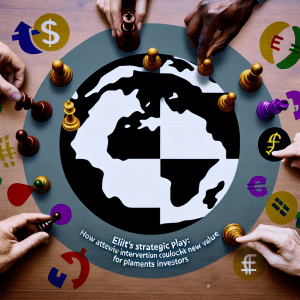Global Payments Inc (GPN) is at a pivotal crossroads, and the latest activist move by Elliott Investment Management could be the catalyst that reshapes this payments giant’s trajectory. Here’s why investors should be paying close attention—and what steps they might consider in response.
The Business Landscape: More Than Just Payments
Global Payments operates through two key segments: Merchant Solutions and Issuer Solutions. The Merchant Solutions segment, which accounts for roughly 75% of revenue, serves small to medium-sized businesses and select enterprise clients with payment processing technology—think authorization, settlement, funding, and dispute management. Meanwhile, Issuer Solutions provides financial institutions and retailers with card portfolio management technologies and B2B payment alternatives.
This dual-segment approach positions Global Payments as a comprehensive player in the payment ecosystem, bridging merchants and financial institutions. However, since peaking at around $220 per share in 2021, the stock has plummeted to about $80, reflecting investor skepticism amid slowing sales growth and competitive pressures from disruptors like Stripe, Shopify, and Fiserv’s Clover.
Elliott Investment Management’s Strategic Play
Elliott, known for its tech-sector activism and deep operational expertise, recently took a position in Global Payments. This move is significant because Elliott doesn’t just invest—they bring a playbook involving seasoned tech executives, consultants, and industry experts to push for strategic change from the boardroom.
The timing couldn’t be more critical. Global Payments announced a blockbuster acquisition of Worldpay from Fidelity National Information Services (FIS) and private equity firm GTCR, valued at $24.25 billion. This deal also involves divesting the Issuer Solutions segment to FIS for $13.5 billion, effectively transforming Global Payments into a pure-play commerce solutions provider.
However, the market reacted sharply, sending shares down 17%. Why? The acquisition contradicts prior management commitments to focus on shareholder returns and smaller bolt-on deals. Plus, the company’s track record with integrating acquisitions—like TSYS and AdvancedMD—has been underwhelming. Paying 10.5 times EBITDA for Worldpay, compared to Global Payments’ own 6.5 times multiple, raised eyebrows about overpayment.
What This Means for Investors
Here’s the key insight: the market has largely priced in failure. That’s a double-edged sword. On one hand, it reflects deep skepticism about management’s ability to deliver on promised $600 million in annual cost synergies and $200 million in revenue synergies. On the other, it creates a potential opportunity if those synergies materialize.
Elliott’s involvement is a strong positive signal. Their expertise in board-level activism can bring much-needed accountability and strategic discipline. A reconstituted board with Elliott representation could enforce an M&A moratorium, prioritize execution, and focus on deleveraging and share buybacks when appropriate.
What Should Investors and Advisors Do Now?
-
Monitor Board Changes and Governance Signals: Elliott’s activism usually leads to board restructuring. Investors should watch for new board appointments with deep M&A integration experience—this is a critical factor for success in the Worldpay deal.
-
Evaluate Management’s Execution Track Record: Given past integration challenges, assess whether management is delivering on synergy targets and operational improvements. Transparency and communication will be key.
-
Consider Valuation and Risk-Reward: At high single-digit EBITDA multiples, the stock’s valuation reflects skepticism but also potential upside if the company can execute. For risk-tolerant investors, this could be an entry point, especially if Elliott’s influence grows.
-
Stay Alert to Sector Consolidation Trends: The payments space is undergoing rapid consolidation, but recent large deals have seen reversals. Investors should be cautious about further large-scale acquisitions without clear strategic rationale and integration plans.
A Unique Perspective: The Integration Imperative
One underappreciated aspect is the integration challenge itself. According to a 2023 McKinsey report, nearly 70% of M&A deals fail to achieve expected synergies, often due to cultural mismatches and operational missteps. Global Payments’ prior acquisitions have stumbled here. Elliott’s activist approach often includes bringing integration veterans onto the board, which could be the difference between value destruction and creation.
What’s Next?
If Elliott succeeds in reshaping the board and enforcing discipline, Global Payments could stabilize and unlock significant shareholder value. However, investors should temper expectations—turnarounds take time, and the payments industry remains fiercely competitive.
For advisors, this situation underscores the importance of active portfolio management and governance oversight. Passive holdings in companies facing activist campaigns warrant close scrutiny and readiness to adjust positions based on evolving governance and strategic outcomes.
Final Thought
Global Payments is a textbook case of a company at an inflection point where activist involvement could be the catalyst for transformation—or a cautionary tale if execution falters. For investors willing to dig deeper, the next 12-18 months will be telling. Aligning with governance changes and monitoring synergy realization will be critical to navigating this complex but potentially rewarding opportunity.
Sources: 13D Monitor, McKinsey & Company, CNBC
Source: How activist Elliott can help Global Payments lift its share price

